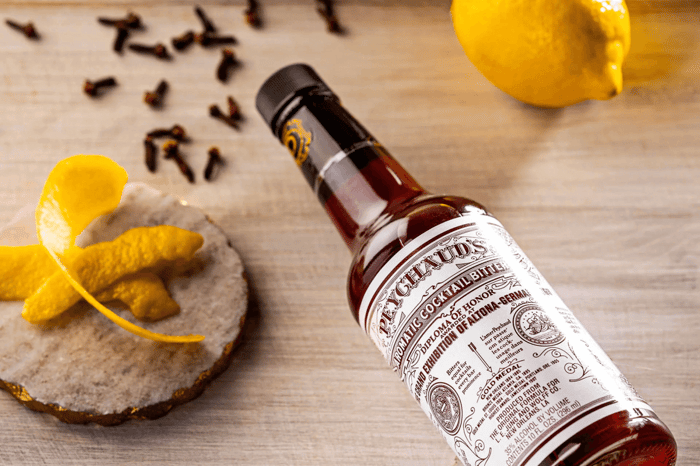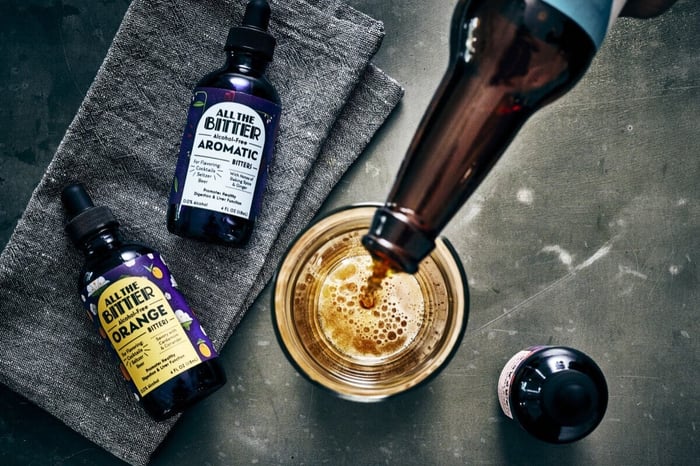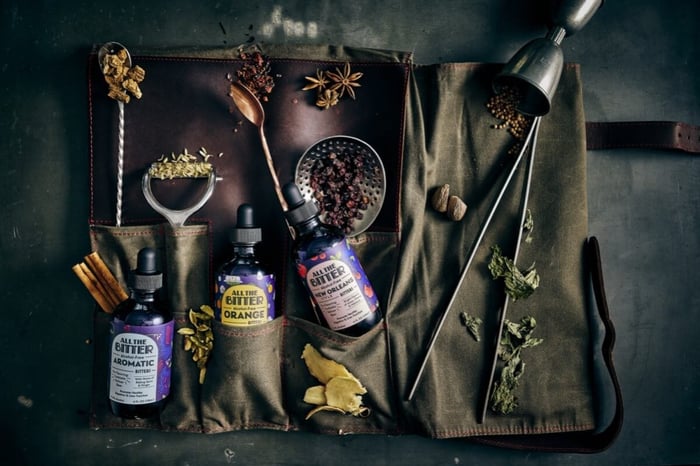Behind nearly every bar in the world you'll find the same three bitters, a set that could easily be considered the "holy trinity" of bitters: Angostura, Peychaud's, and orange bitters. While Angostura is most often called for in classic cocktails, Peychaud's bitters holds an important place in the Sazerac cocktail, in addition to many other classic and modern drinks. Like Angostura, it has a fascinating history, and is inextricably linked to American cocktail culture.
Join us on a quick tour as we explore the history of Peychaud's bitters, its uses in cocktails, comparisons to Angostura, and substitutions for Peychaud's for when you want to try something new.
Table of Contents
The History of Peychaud's Bitters
Peychaud's Bitters, a legendary elixir that has left an indelible mark on the world of mixology, owes its iconic status to the visionary craftsmanship of Antoine Amédée Peychaud. Born circa 1803, Peychaud found his way to New Orleans during a tumultuous period marked by the slave revolts in Saint-Domingue (now Haiti). Fleeing the violence and economic collapse, Peychaud brought with him a medicinal tonic—a proprietary blend of botanicals, including gentian and anise—that would soon become known as Peychaud's bitters.
In 1832, Peychaud opened his own apothecary on Royal Street, where he dispensed his patented herbal remedy and introduced locals to the vibrant flavors of his bitters. Legend has it that Peychaud and his friends were the first to experiment with adding his bitters to the popular Sazerac de Forge & Fils brandy, eventually leading to the creation of what is sometimes incorrectly cited as the first American cocktail—the Sazerac. (Cocktails had existed since at least 1806.) Over time, the Sazerac recipe evolved to include Sazerac rye whiskey, Peychaud's bitters, a sugar cube, and a glass rinsed with absinthe, and in 2008 it was named the official drink of New Orleans.
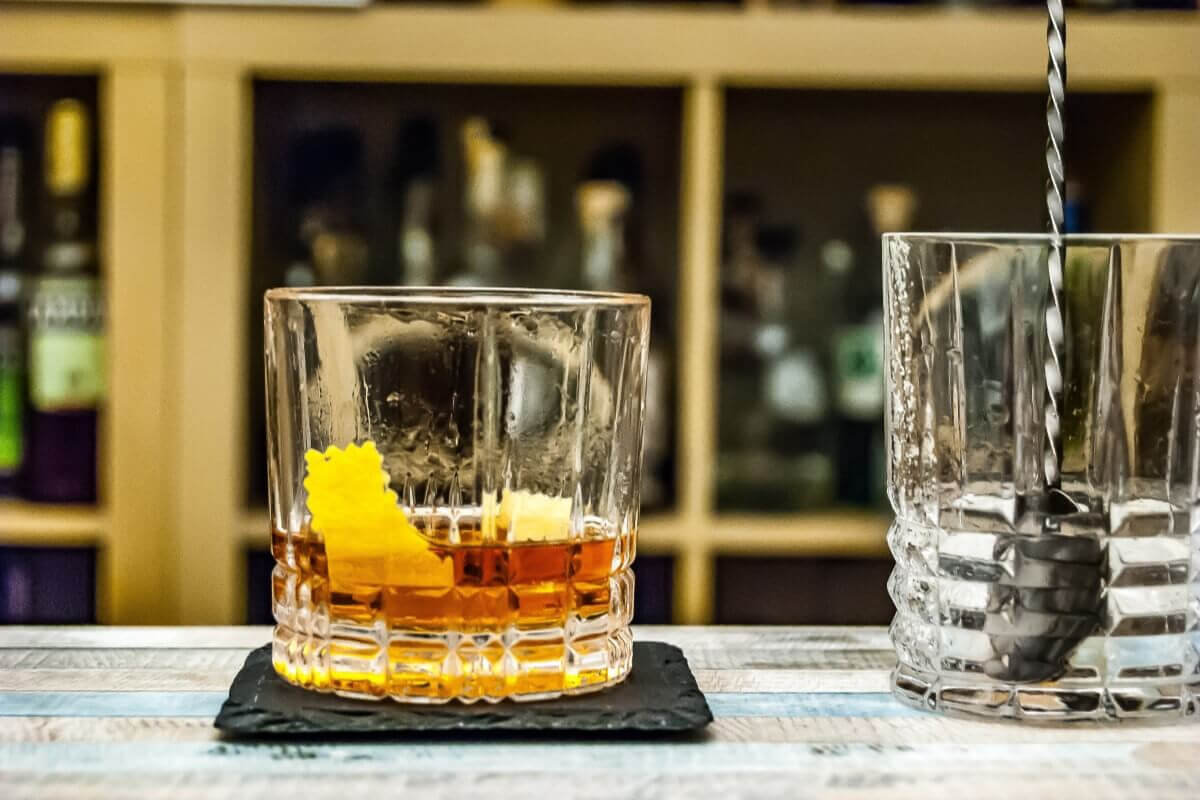
Cocktails with Peychaud's Bitters
Peychaud's Bitters is a versatile ingredient that lends its unique flavor profile to an array of cocktails, both classic and modern. One of the most famous of these cocktails is the Sazerac. Its origins can be traced back to New Orleans in the 19th century, where it was crafted using Peychaud's bitters, a dash of absinthe, sugar, and a base of French brandy (which was eventually replaced with American rye whiskey, which is how we know the cocktail today). The Sazerac embodies the spirit of the Crescent City, offering a strong and aromatic libation that perfectly balances sweetness and bitterness.
The Vieux Carré, named after the French Quarter of New Orleans, is another noteworthy cocktail that features Peychaud's Bitters. The drink is attributed to Walter Bergeron, a bartender at the Carousel Bar in the Hotel Monteleone in the 1930s. This cocktail combines rye whiskey, Cognac, sweet vermouth, Bénédictine, and a blend of Angostura and Peychaud's bitters. The result is a smooth yet boozy, slightly sweet libation with a remarkable herbal complexity that's a result of the brilliant mixing of base spirits, liqueurs, and bitters.
The Seelbach cocktail, a bubbly blend of bourbon, orange liqueur, Angostura bitters, Peychaud's bitters, and Champagne, carries with it an interesting backstory. Initially believed to be a classic cocktail rediscovered in the 1990s, the Seelbach was attributed to the historic Seelbach Hotel in Louisville. However, it was eventually disclosed that bartender Adam Seger concocted the drink, creating a fictional narrative to captivate drinkers. Despite the fabricated origin, the Seelbach remains a delicious cocktail.
Peychaud’s has also made its way into some unorthodox cocktails that test the limits on bitters. The Sawyer, essentially a bitters-soaked twist on a gimlet, was created by famed bartender Don Lee at Ssäm Bar in New York City. The drink features a whopping 28 dashes of bitters, including 7 of Peychaud's, lending a bold and distinctive character to the otherwise bright and fresh gimlet.
Additionally, Gunshop Fizz—the signature drink of the book Rogue Cocktails, self published in 2009 by New Orleans bartenders Maks Pazuniak and Kirk Estopinal—showcases an unconventional use of Peychaud's bitters. This cocktail pushes the boundaries by incorporating a full two ounces of Peychaud's alongside Sanbitter, lemon juice, strawberries, citrus peel, and cucumber (a la Pimm’s Cup), resulting in a surprisingly refreshing and relatively easy drinking cocktail, despite the abundance of bitters.
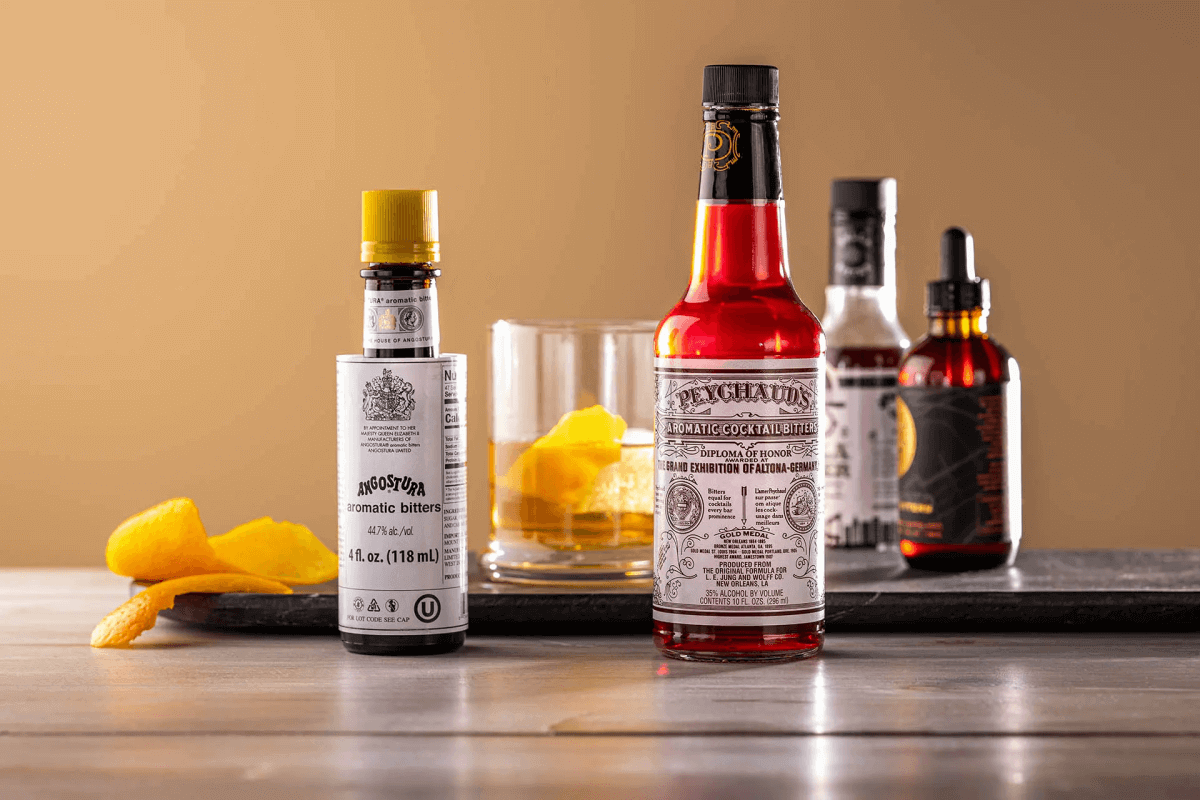
Peychaud's vs Angostura Bitters
When comparing Peychaud's and Angostura bitters, the contrasting flavor profiles showcase the unique characteristics of each brand. Peychaud's bitters, known for its delicate and lighter profile, entices the palate with its sweet and aromatic notes. Anise and cherry are the two primary flavors, balanced by hints of clove, orange, and mint. The bitter finish adds complexity, balancing the sweetness and ensuring a well-rounded experience. And that bright red hue can be spotted from a mile away!
On the other hand, Angostura emanates a deeper and more robust character. Its spiced flavor profile is reminiscent of cloves, cinnamon, nutmeg, and allspice, lending a warm and comforting sensation to cocktails. The interplay of baking spices, plus an abundance of bitter, earthy root and bark flavors, forms the foundation of Angostura, creating a rich and savory experience. Angostura's bouquet also showcases subtle citrus and floral undertones, complementing the dominant spice notes and adding layers of complexity.
Put simply, whereas Peychaud's is light and bright, Angostura is deep and rich. These distinct flavor profiles give bartenders and cocktail enthusiasts a diverse range of options to choose from when crafting their libations. Whether one seeks the delicate sweetness of Peychaud's or the robust spiciness of Angostura, both bitters contribute to the complexity and depth of flavor in cocktails, allowing for endless possibilities and personalized creations that cater to individual tastes.
Can Peychaud's Bitters Be Used in an Old Fashioned?
Absolutely! While Angostura bitters are traditionally used in an Old Fashioned, substituting Peychaud's bitters can offer a delightful twist on the classic. Peychaud's brings a lighter, sweeter flavor profile to the cocktail, with its notes of candied cherry, clove, orange, and a very high-toned anise aroma. This can add a unique dimension to your Old Fashioned, making it a refreshing alternative to the traditional version.
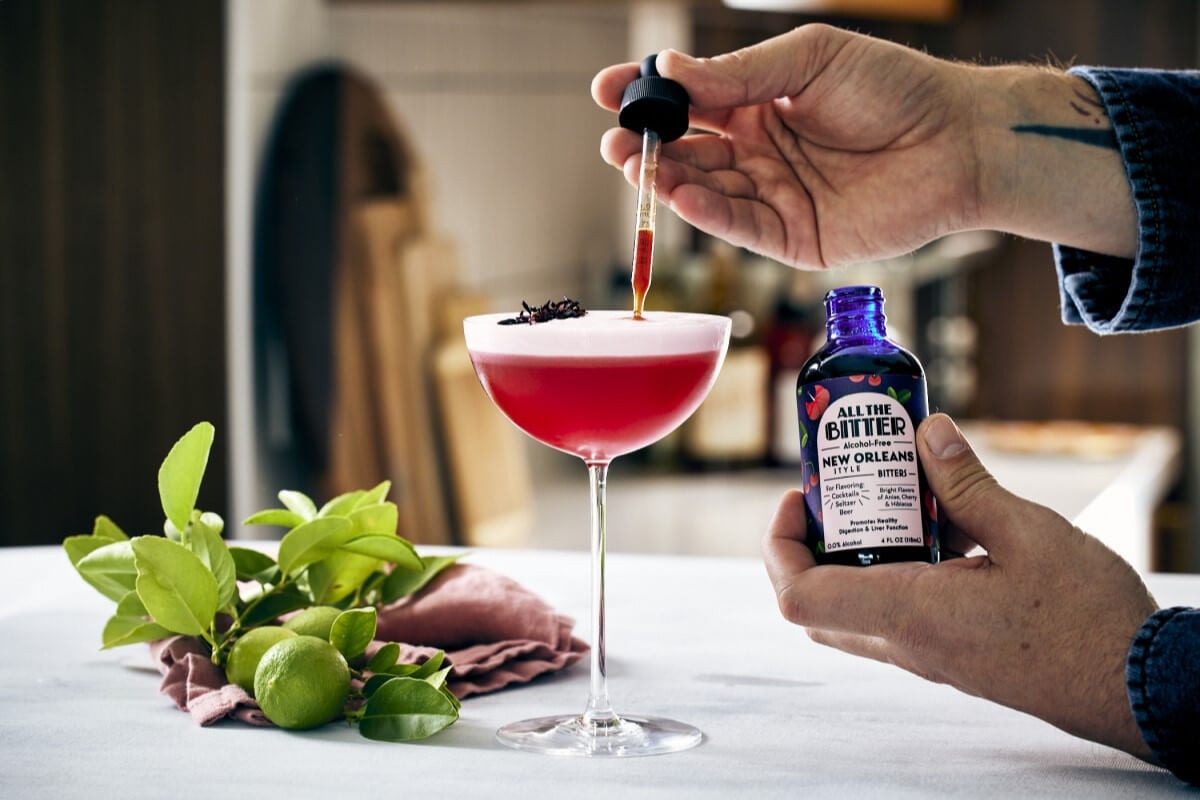
Substituting Peychaud's Bitters
There are various bitters companies that produce bitters in a similar style to Peychaud's, which can serve as suitable replacements in recipes. These include The Bitter Truth Creole Bitters, Scrappy's Orleans Bitters, and All The Bitter's New Orleans Bitters. Each of these alternatives brings its own unique twist to the classic Peychaud's flavor profile, offering exciting possibilities for cocktail creation. In a Sazerac, traditionally made with Peychaud's, you could replace the bitters with a dash of absinthe or Herbsaint.
Is Peychaud's Alcoholic?
Yes, Peychaud's Bitters does contain alcohol, with an ABV (alcohol by volume) of about 35%. However, it's important to note that bitters are typically used in small quantities in cocktails, so the overall alcohol content added to a drink by the bitters is minimal. If you're looking for a non-alcoholic alternative with a similar flavor profile, All The Bitter's New Orleans Bitters is a fantastic option. They offer the same complexity and depth of flavor as Peychaud's, but without the alcohol, making them perfect for both alcoholic and non-alcoholic cocktails. You can even make a non-alcoholic Sazerac with them!
Introducing All The Bitter's New Orleans Bitters
While Peychaud's Bitters holds a special place in cocktail history, there's a new player in town that's making waves in the bitters world—All The Bitter's New Orleans Bitters.
Inspired by the flavor profile of Peychaud's, our New Orleans Bitters are a celebration of NOLA and American cocktail culture. Packed with the same high-toned anise and tart cherry flavors that Peychaud’s is known for, we also include a healthy dose of hibiscus, rosehips, and warm spices. Made with organic, wild-foraged, and functional botanicals like milk thistle seed, dandelion root, and Schisandra berry, our New Orleans bitters may also support digestion and liver health.
The winner of 5 awards (and counting!) from major spirit competitions including gold from the Bartender Spirit Awards and the World Alcohol-Free Awards, our New Orleans bitters can be used in both alcoholic and non-alcoholic cocktails, making them a versatile addition to any bar.
New Orleans Spiced Cherry Bitters

$19.00
Same flavor, new name! Now in 2oz and 5oz bottles. Inspired by Antoine Peychaud’s iconic 19th-century recipe from New Orleans, our Spiced Cherry bitters are tart, vibrant, and anise-forward. Rooted in flavor and health, these bitters are handmade in small… read more
The Future of Bitters
As we continue to explore the world of bitters, it's clear that Peychaud's bitters has paved the way for many other brands, including All The Bitter's New Orleans Bitters. By understanding the history and unique characteristics of Peychaud's, we can appreciate the evolution of bitters and look forward to the exciting innovations that lie ahead.

